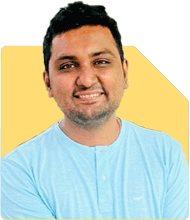Stuck in ETL Technical Lead Role for 20 Years - Career Advice Needed?
Krishna Kumar | Answer |Ask -Follow
Workplace Expert - Answered on Aug 09, 2024
Before branching out on his own, he worked with companies like Microsoft, Rediff, Flipkart and InMobi.
With over 25 years of experience under his belt, KK is a regular speaker at industry events and academic intuitions, both in India as well as abroad.
KK completed his MBA in marketing from the Sri Sathya Sai Institute of Higher Learning in Andhra Pradesh and his management development programme from XLRI, Jamshedpur.
He has also completed his LLB from Nagpur University and diploma in PR from Bhavan’s College of Management, Nagpur, where he was awarded a gold medal.... more

Hi Sir, I have 20 years experience as a ETL technical lead, and since i am very good with attention to detail, i kind of stuck with this tech lead role for too long now. My salary is stuck at 15 lakhs and with 20 years experience and the technologies that keep changing, finding job is getting difficult. Even after learning new technologies, i am repeatedly being put in same old legacy stuff and also for my experience, they expect more from me which i am not able to answer due to my under exposure . I should have been atleast a senior architect now. But technology is becoming a hard nut to chew on these days. i am also inclined towards program manager kind of job but then since i have been in technology for 20 yrs now, if i have to start as a manager it will take a whole lot of time and effort to reach program manager role. Also, if all i have to concentrate is on becoming a program manager then i feel that this 20 yrs of experience may go waste..and maybe i repent that i should have started early in my career and should have taken a project manager role so that by now i would have become a program manager...i am so lost and inspite of being so senior i am not able to make decisions nor do i have clarity on what i want...
It is indeed difficult to keep pace with changin technology, but unfortunately that is the reality. The advantage you have is being hands on for all these years in tech. I would suggest you learn a few of the new age languages (javascript / python) and then become hands on by taking up freelancing assignments from odesk.com upworks.com freelancer.com (probably for a year or two) and then re-apply - there are a lot of opportunities to earn for good engineers with actual tech-hard-skills.
All the best
You may like to see similar questions and answers below
Abhishek Shah | Answer |Ask -Follow
HR Expert - Answered on Aug 23, 2023
Nitin Sathe | Answer |Ask -Follow
HR, Recruitment Expert - Answered on Jan 12, 2024
Dr Dipankar Dutta |1836 Answers |Ask -Follow
Tech Careers and Skill Development Expert - Answered on Dec 05, 2025
Ulhas Joshi |280 Answers |Ask -Follow
Mutual Fund Expert - Answered on Dec 05, 2025
Dr Dipankar Dutta |1836 Answers |Ask -Follow
Tech Careers and Skill Development Expert - Answered on Dec 04, 2025
Ravi Mittal |676 Answers |Ask -Follow
Dating, Relationships Expert - Answered on Dec 04, 2025
Anu Krishna |1745 Answers |Ask -Follow
Relationships Expert, Mind Coach - Answered on Dec 04, 2025
Anu Krishna |1745 Answers |Ask -Follow
Relationships Expert, Mind Coach - Answered on Dec 04, 2025
Mayank Chandel |2562 Answers |Ask -Follow
IIT-JEE, NEET-UG, SAT, CLAT, CA, CS Exam Expert - Answered on Dec 04, 2025
Mayank Chandel |2562 Answers |Ask -Follow
IIT-JEE, NEET-UG, SAT, CLAT, CA, CS Exam Expert - Answered on Dec 04, 2025
Mayank Chandel |2562 Answers |Ask -Follow
IIT-JEE, NEET-UG, SAT, CLAT, CA, CS Exam Expert - Answered on Dec 04, 2025
Mayank Chandel |2562 Answers |Ask -Follow
IIT-JEE, NEET-UG, SAT, CLAT, CA, CS Exam Expert - Answered on Dec 04, 2025



























